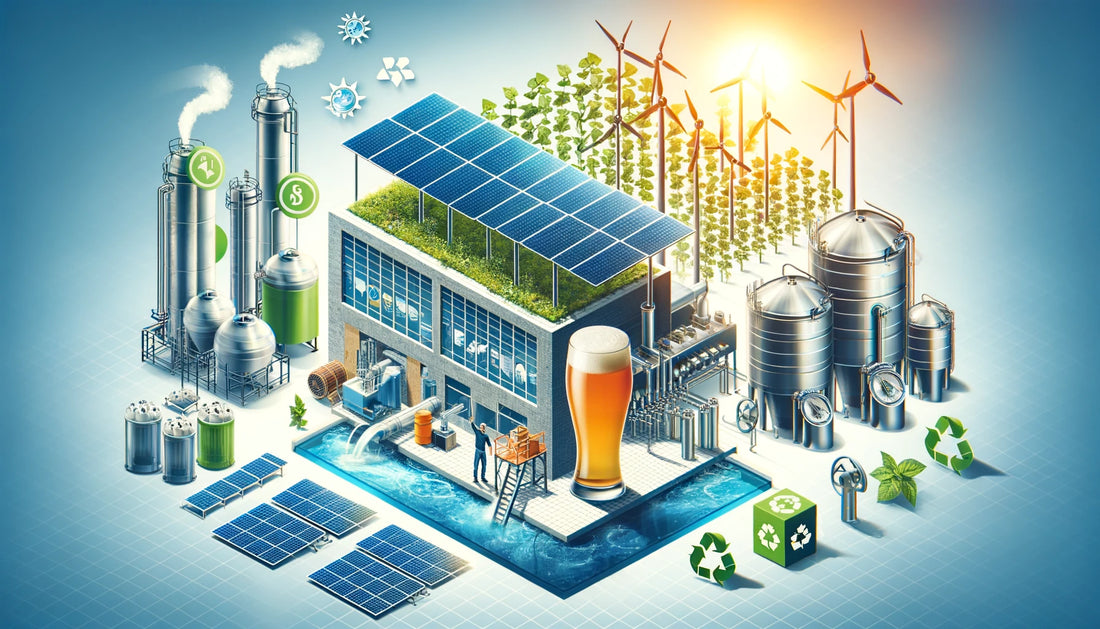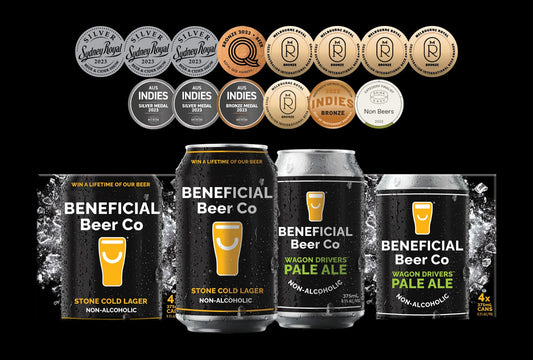We're all about sustainable brewing practices that make a real difference. In an industry where environmental impact is pushed to the sidelines, it's about time we explore what Beneficial Beer, our partners, and other brewing vanguards are doing to set a new standard for the brewing industry.
.
Recycling Plant Water
One of our key sustainability initiatives is our state-of-the-art water recycling system. Here’s how they work:
Water recycling in our brewery involves collecting, treating, and reusing wastewater from the brewing process. This water can be used for cleaning, cooling, and other operations. Rest assured, like all breweries, only the effluent from the brewing process is recycled.
With recent water reforms, a new path has been paved for more innovative recycling practices. For example, one brewery managed to cut its water consumption from 3.8 litres per litre of beer to just 2.2 litres.
Carlton United Breweries (CUB) at Yatala, just south of Brisbane, stands as one of the largest breweries in the country. They use less than 2.5 litres of water per litre of beer, thanks to their Upflow Anaerobic Sludge Blanket (UASB) system.
Similarly, Fourex Breweries at Milton aims to use recycled water to clean its beer lines, potentially saving over one million litres of water daily.
By adopting advanced water recycling methods, Beneficial Beer conserves water resources to reduce our environmental footprint.

Solar Energy
At Beneficial Beer, we harness the power of the sun to brew our exceptional beers sustainably. With Australia boasting the highest solar radiation per square meter of any continent, we’re positioned to make the most of solar energy resources.
Solar technologies are a game-changer for sustainability because they don't emit CO2. One study found that a 10 kWp solar panel system can reduce annual greenhouse gas emissions by 41%, slash energy costs by up to 39.9%, and achieve payback in 4.3 to 6.6 years.
How many solar panels are needed to brew? Let's keep it simple:
- The average solar panel generates 1.5 kilowatt-hours (kWh) of energy per day.
- Breweries require about 0.6 kWh for every litre of beer produced.
- To put this into perspective, it takes around 40 solar panels to produce the 60 kWh needed to brew 100 litres of beer.

Spent Grain for Cows
One of the most abundant byproducts of beer brewing is spent grain — mainly the husks, residual starch, and proteins from used barley or other grains.
Spent grain has a heap of uses, including:
- Energy Recovery: Spent grain can be used as a substrate for biogas or second-generation ethanol production, replacing natural gas and gasoline.
- Reuse as Human Food: While promising and high in fibre, protein, and minerals, it needs more development to improve final product quality and consumer acceptance.
- Reuse in Chemical Processes: Rich in cellulose and polysaccharides, it can be used to make paper towels, business cards, and coasters.
- Agricultural Recycling: When used as animal feed, spent grain boosts milk production in cows and enhances meat quality in livestock. It also improves soil fertility when combined with sludge or woodchips.
What We Do at Beneficial Beer
We repurpose our spent grain as feed for cattle since it is rich in protein, fibre, and other nutrients. This low-cost feed helps farmers out a bunch, and the cows too: spent grain aids in the digestion process for cows, promoting better health and higher milk production.

.
Carbon Offset Projects
We’re always on the lookout for opportunities to help out the planet.
That’s why we've partnered with Clima to support impactful carbon offset projects.
For each case of beer sold, our community can choose which three projects below to support, making every sip an investment in a greener planet:
Biodiverse Carbon Conservation
The first project is a reforestation initiative in South Western Australia. Aiming to plant 3.8 million native trees on 2500 hectares of former farmland, the goal is to remove carbon from the atmosphere, mitigate climate change and more. So far 59,000 tons of CO2 emissions have been captured.
Evercreech Plantation Forestry
The Evercreech Plantation Forestry project, located in the Tyne Valley region of Tasmania, focuses on capturing and storing greenhouse gases. This project delays the harvesting of plantation timber, allowing trees more time to absorb CO2. So far 320,000 tons of CO2 have been removed over 630 hectares of land.
Paroo River North
In Queensland, the Paroo River North project promotes the regrowth of native forests, protects local wetlands, and enhances biodiversity. The regenerating forest creates a thriving habitat for a variety of plants and animals.

The BetaCarbon Partnership
Partnering with BetaCarbon is a key sustainable initiative for Beneficial Beer.
BetaCarbon operates as a carbon trading platform, exchanging and providing Australian Carbon Tokens (BCAUs) to partners. Each BCAU represents 1 kilogram of captured CO2.
Beneficial Beer allocates a certain number of BCAUs to BetaCarbon for every case of beer sold. Investors can purchase BCAUs on the BetaCarbon platform, gaining exposure to the carbon market and supporting carbon capture projects.
The blockchain technology used by BetaCarbon allows investors to hold their tokens in digital wallets.
.
The Future of Brewing, One Can at a Time
How can we encourage more breweries to join the movement towards sustainability?
The brewing industry is traditionally resource-intensive, but as the impacts of unsustainable practices become clearer, so does the need to shift to innovation.
Collective efforts to sustainably pivot the brewing industry and beyond require:
- Education and Awareness
- Financial Incentives
- Alliances and Networks
- New Consumer Demand
- Innovation and Technology
Ready to support sustainable brewing? Discover our range of non-alcoholic beers and taste the difference that sustainability makes. Every sip you take contributes to our environmental goals.




